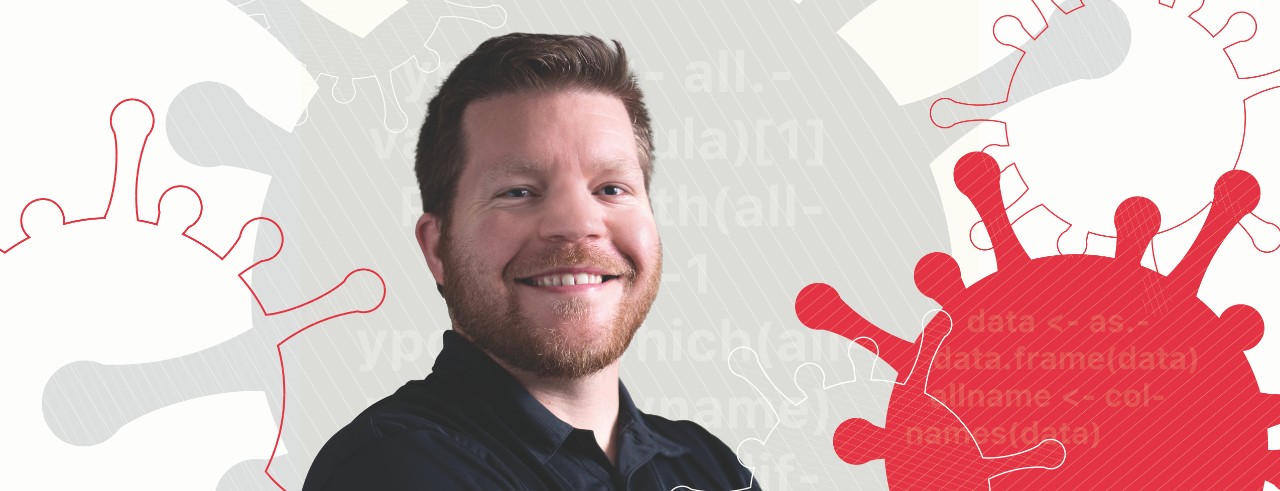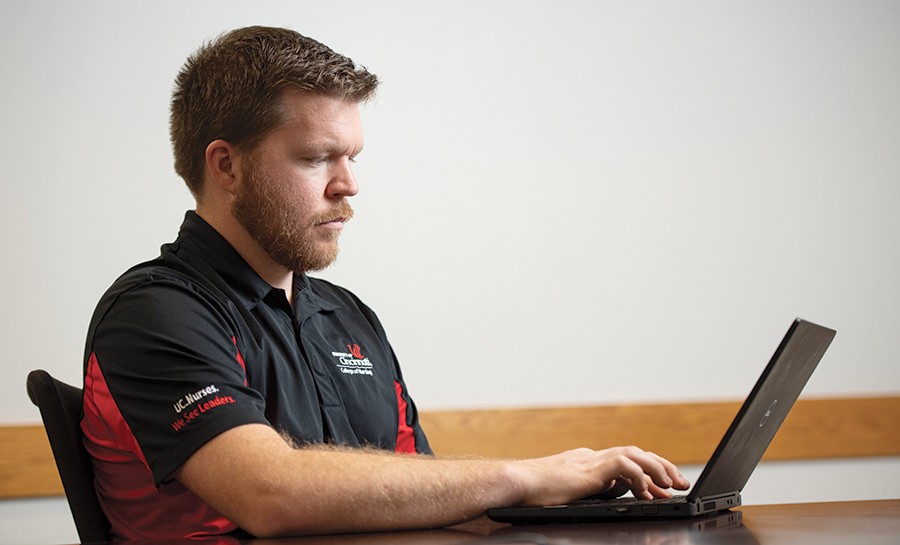
Beating COVID with big data
UC nursing professor is mining a massive data set for drugs that protect against COVID-19
Josh Lambert knows the power of big data and he's using it to uncover drugs or drug combinations with the potential to protect against COVID-19.
Mining a research database that includes up-to-date health insurance claims data for about one-third of Americans, Lambert, PhD, assistant professor and biostatistician for UC College of Nursing, is looking for COVID-positive patients whose regular medication regimen could have unintentionally protected them from the virus. Results will offer researchers a foundation for future clinical trials.
Lambert has completed an analysis on single drugs and looks to publish findings by early 2022. In the second phase of his project, backed by a $250,000 National Institutes of Health grant, Lambert will use a proprietary algorithm and complex statistical models to identify drug combinations with similar protective effects against COVID. It's no small task and this is where Lambert's expertise and innovation shine.
"If you have 1,000 drugs — and there are easily that many in circulation — and you want to look for all of the three-drug combinations that could exist, that’s 166 million combinations, so there’s a lot of combinations that could exist and we have to be strategic about how we check those. That’s what my algorithm does."
Developing a new prescription medication requires years and billions of dollars. Repurposing existing drugs with Food and Drug Administration approval offers a faster and more resource-effective approach to finding treatments for COVID, and Lambert's study contributes further speed and efficacy. It also could serve as a catalyst for researchers.
"Many health professionals might have anecdotal thoughts about what could work but no evidence to support further research. Some of our findings could be fuel to their fire to follow up with clinical trials."
At the same time, Lambert knows his research has the potential to become misinterpreted by the public; he stresses his work is exploratory and meant to generate hypotheses for further testing.
"There’s never been as much of a vested interest from the public and it can be hard to block out the noise," Lambert says. "We want to be careful as to what we suggest, but also remain unbiased. Our hope is that this study will provide new ideas and evidence for drugs that might have been overlooked."
A Statistician in the College of Nursing
Lambert was hired in 2018 by Gordon Gillespie, PhD, DNP, RN, FAAN, professor, associate dean for research and PhD program director, as part of a broader strategy to secure more grant funding for the college. Alongside his own research, Lambert works with nursing faculty, staff and students to complete statistical analyses for grant work and course projects. His assistance has contributed to college-wide efforts that have led to a more than three-fold increase in annual research and program grant funding since 2018.
"I think what's so outstanding about Josh is that he's incredibly knowledgeable and talented, but also very approachable and supportive and willing to teach others," says Beth Ann Clayton, DNP, CRNA, FAAN, professor and nurse anesthesia program director. Clayton has worked with Lambert to analyze data related to her research on post-cesarian pain control. Students in Doctor of Nursing Practice programs also work with Lambert on quality improvement projects.
"Josh values what every student wants to do, and if you instill that positive experience, they will go forward with that and feel confident enough to give it a try in the future. It's important that we're developing graduates like that," Clayton says.
Teenu Xavier, MSN, RN, a PhD in nursing student, has collaborated with Lambert on several projects, including one that analyzes Tweets from nurses on the topic of COVID. Lambert oversees the project and provides training on data cleaning and analysis.
"(Lambert's) readiness to teach and mentor is commendable," Xavier says.
To further assist faculty, staff and students and conduct his own research, Lambert has assembled a "supercomputer" with massive data sets. In 2019, he and other college faculty received a $25,000 grant from the university to use the data to examine the relationship between pre-natal exposure to opioids and developmental outcomes.
I wanted to ... do big-data research in health and bring biostatistics and nursing together to solve some of the world's biggest problems.
Josh Lambert, PhD assistant professor & biostatistician
Lambert, who has a PhD in biostatistics and epidemiology and master's degrees in mathematics and statistics, says he draws inspiration from modern nursing's founder Florence Nightingale, a pioneer of data visualization and statistics. Nightingale collected data and used applied statistical methods to save lives during the Crimean War in the mid-1800s.
"I thought, How can I take the idea of what she pioneered a hundred years ago and make it my own in a way that's novel and unique and world-leading?" Lambert says. "I wanted to start this (supercomputer) so that we could do big-data research in health and bring biostatistics and nursing together to solve some of the world's biggest problems."

Alongside his own research, Josh Lambert, Assistant Professor and Biostatistician, works with UC College of Nursing faculty, staff and students to complete statistical analyses for grant work and course projects. Photo/Colleen Kelley/UC Creative + Brand
Featured image at top:
Photography – Colleen Kelley/UC Creative + Brand
Photo Illustration – Natalie Broering/UC College of Nursing
Related Stories
Bearcats Racing speeds toward a victorious season
April 12, 2025
Bearcats Motorsports, Bearcats Baja and Bearcats EV are racing to build winning car models at UC’s 1819 Innovation Hub as competition season approaches.
CEAS Expo unveils inaugural innovation awards – discover the...
April 11, 2025
During the CEAS Expo’s first-ever 1819 Innovation Awards, five groundbreaking inventions received recognition. Learn about prize winners from the CEAS Expo and their transformative projects.
UC recaptures national championship in disc golf
April 10, 2025
The University of Cincinnati’s “Discats” won the national disc golf championship for the second time in three years.
